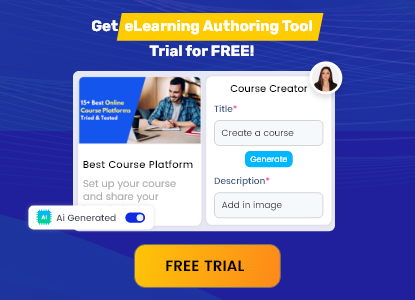Popular authoring tools like Articulate Storyline, Adobe Captivate, Lectora, and iSpring have made a significant impact on eLearning development. However, the introduction of AI-powered authoring tools like Cognispark AI is revolutionizing the industry by making the process even more intelligent and seamless.
Getting Started with Responsive eLearning Development
- Content Gathering and Analysis
Begin by collecting and analyzing content based on the learning objectives. This includes gathering text, images, videos, and other multimedia elements that align with the course’s goals. Storyboarding is often done using tools like PowerPoint or Word, but some authoring tools provide built-in instructional design support.
- Course Structuring and Storyboarding
Once the content is ready, create a storyboard outlining the course structure, navigation, and interactivities. This phase ensures that the eLearning course follows a logical flow, engaging learners effectively.
Development Process Using an Authoring Tool
1. Setting Up the Project
Once the storyboard is approved, open a new project in your chosen eLearning authoring tool. Depending on the tool, you can choose from various options, such as:
- Record screen (ideal for software training)
- Import PowerPoint (convert existing presentations into interactive courses)
- Import Quizmaker (add assessments easily)
- Use project templates (ready-to-use structures for faster development)
2. Choosing the Right Template
Select a template that aligns with the course’s design and objectives. Templates often include:
- Pre-designed layouts for text, images, and videos
- Interactive elements such as buttons, quizzes, and animations
- Customizable features to match branding guidelines
3. Customization and Interactivity
Once the basic structure is in place, start adding interactive elements:
- Text and Narration – Add learning content with voiceovers or narration.
- Characters and Avatars – Use illustrations or AI-generated avatars to enhance engagement.
- Quizzes and Assessments – Insert drag-and-drop, multiple-choice, and scenario-based quizzes.
- Triggers and Actions – Define learner interactions based on choices and behaviors.
- Simulations and Gamification – Create real-world learning scenarios to boost retention.
Making the eLearning Course Responsive
Responsive eLearning ensures that the course adapts to different screen sizes, making it accessible on desktops, tablets, and mobile devices. Some authoring tools require manual adjustments, while others, like Cognispark, Articulate Storyline’s responsive player, automatically adjust the content for a seamless user experience.
To ensure your eLearning course is fully responsive:
- Preview the course on multiple devices before publishing.
- Use flexible layouts that adapt to different screen sizes.
- Optimize media elements to ensure fast loading times.
- Test interactions and animations for smooth performance on all devices.
Publishing and Finalizing the Course
Once the course is fully developed and reviewed, proceed with the publishing phase:
- Review and Approvals – Conduct an internal review, make necessary edits, and get final approvals.
- Save a Backup Copy – Always keep a copy of the project for future modifications.
- Publish the Course – Choose from different formats such as SCORM, xAPI, or HTML5, ensuring compatibility with Learning Management Systems (LMS).
- Test on an LMS – Upload the course to an LMS and conduct user testing to check responsiveness and interactivity.
Conclusion: Why Cognispark AI is the Best eLearning Authoring Tool
Among the numerous authoring tools available, Cognispark AI stands out as the best choice for creating responsive eLearning content. This AI-powered tool simplifies the entire course development process by offering:
- Smart AI-based content structuring
- Automated interactivity suggestions
- Adaptive learning personalization
- Seamless LMS integration
- Multi-device responsiveness without manual tweaking
With Cognispark AI, developing high-quality, engaging, and responsive eLearning using an authoring tool has never been easier. Whether you are an instructional designer, corporate trainer, or L&D professional, this tool empowers you to create compelling digital learning experiences with minimal effort.
Ready to elevate your eLearning development? Try Cognispark AI today and experience the future of authoring tools!
























